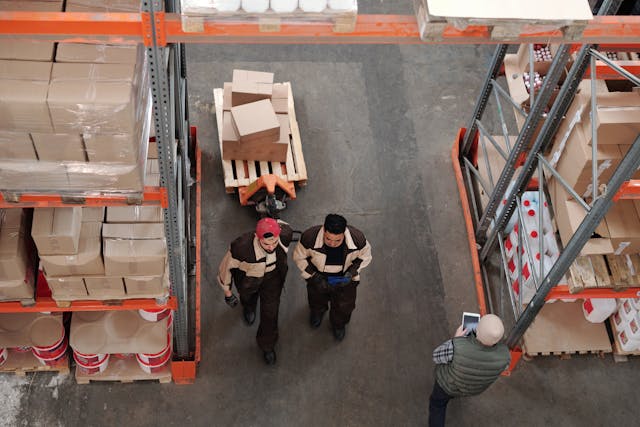
When selling on Amazon, one of the most important decisions you’ll make is choosing how to fulfill your orders. Amazon offers two primary fulfillment options: Fulfillment by Amazon (FBA) and Fulfillment by Merchant (FBM). Both have their advantages, but the best choice depends on your business model, goals, and resources. In this blog post, we’ll break down the differences between FBA and FBM to help you determine which option is right for your Amazon business.
What is Amazon FBA?
Fulfillment by Amazon (FBA) is a service where Amazon handles most of the logistics for you, including storage, packing, shipping, and even customer service.
Here’s how it works:
- You send your products to an Amazon fulfillment center.
- Amazon stores your inventory.
- When a customer orders your product, Amazon picks, packs, and ships it.
- Amazon handles returns and customer service for these orders.

Advantages of FBA:
- Prime Eligibility: FBA products are eligible for Amazon Prime’s free two-day shipping, which can lead to higher conversion rates.
- Time Savings: Amazon takes care of packing, shipping, and customer service, giving you more time to focus on other areas of your business.
- Increased Sales: Many customers specifically look for Prime-eligible products, so using FBA can increase visibility and boost sales.
- Efficient Returns Management: Amazon handles returns, making the process easier for both you and the customer.
Disadvantages of FBA:
- Costs: FBA comes with storage fees, fulfillment fees, and long-term storage fees if your inventory stays in Amazon’s warehouse too long.
- Less Control: You give up some control over how your products are packed and shipped, which might not align with your brand’s preferences.
- Inventory Management: Keeping track of inventory across multiple fulfillment centers can be challenging, especially if you have high turnover products.
What is Amazon FBM?
Fulfillment by Merchant (FBM) means that you, the seller, are responsible for all aspects of order fulfillment. You manage inventory, pack the products, and ship them directly to the customer.

Advantages of FBM:
- Lower Costs: FBM eliminates the fees associated with FBA, such as storage and fulfillment fees. This can be particularly beneficial if you sell large or heavy items.
- Greater Control: You have full control over the packaging and shipping process, which can be important for maintaining your brand’s standards.
- Ideal for Small or Niche Sellers: If you’re selling a small number of products or niche items with low turnover, FBM can be a more cost-effective option.
Disadvantages of FBM:
- No Prime Eligibility: FBM products are not automatically eligible for Prime shipping, which could limit your appeal to Prime customers.
- Time-Consuming: Handling fulfillment yourself can be time-consuming, especially as your sales volume grows.
- Customer Service: You’ll be responsible for managing returns, answering customer inquiries, and addressing complaints, which can add to your workload.
FBA vs. FBM: A Side-by-Side Comparison
| Aspect | FBA (Fulfillment by Amazon) | FBM (Fulfillment by Merchant) |
| Prime Eligibility | Yes | No |
| Shipping & Handling | Managed by Amazon | Managed by the seller |
| Customer Service | Managed by the seller | Handled by the seller |
| Fees | Storage, fulfillment, and other fees | Seller bears all shipping costs |
| Control Over Packaging | Limited control | Full control |
| Best For | Sellers looking to scale quickly, high turnover products | Sellers with low inventory turnover, large/heavy items |
Which Option is Best for Your Business?
Now that you understand the key differences between FBA and FBM, let’s look at some factors to help you decide which is best for your business:
- Volume of Sales: If you’re selling a large volume of products, FBA can save you time by outsourcing fulfillment. If you only have a few orders each week, FBM might make more sense.
- Product Size and Weight: FBA fees increase for large or heavy items, so if you sell these types of products, FBM might be more cost-effective.
- Control vs. Convenience: Do you want more control over the shipping process or prefer the convenience of Amazon handling everything? FBA offers convenience, but FBM gives you full control.
- Storage Capabilities: If you don’t have the space to store inventory, FBA could be a great solution. If you have space at home or in a warehouse, FBM may work well.
Conclusion: FBA or FBM?
Both FBA and FBM have their advantages and disadvantages, and the right choice depends on your business model, goals, and resources. If you’re looking for convenience, Prime eligibility, and are willing to pay for it, FBA could be a great option. On the other hand, if you want more control over fulfillment and want to avoid additional fees, FBM might be better suited for you.
Evaluate your specific needs and consider experimenting with both models to see what works best for your business.
